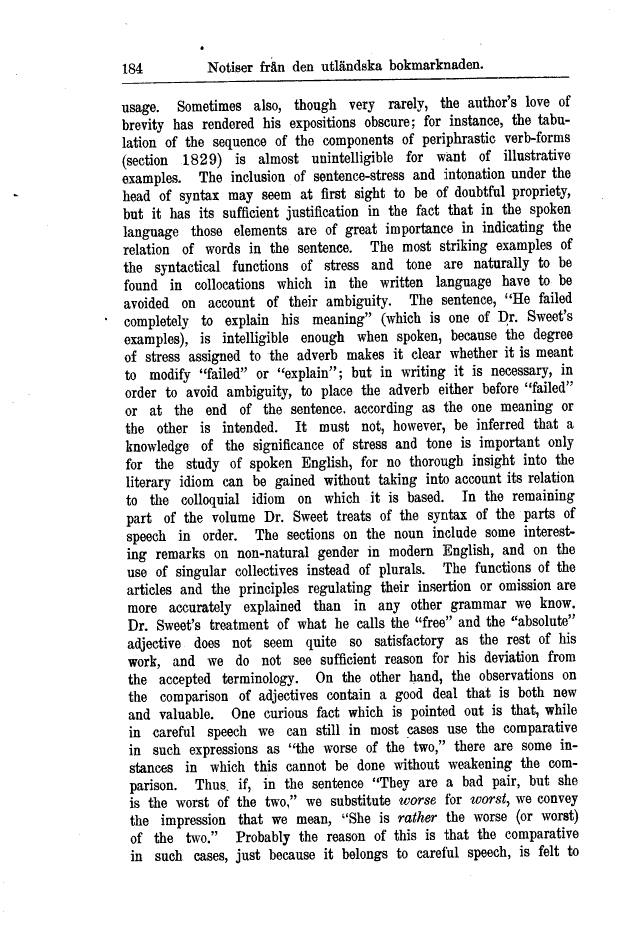
Full resolution (TIFF) - On this page / på denna sida - Sidor ...

<< prev. page << föreg. sida << >> nästa sida >> next page >>
Below is the raw OCR text
from the above scanned image.
Do you see an error? Proofread the page now!
Här nedan syns maskintolkade texten från faksimilbilden ovan.
Ser du något fel? Korrekturläs sidan nu!
This page has never been proofread. / Denna sida har aldrig korrekturlästs.
184
Notiser från den utländska bokmarknaden. 184
usage. Sometimes also, though very rarely, the author’s love of
brevity has rendered his expositions obscure; for instance, the
tabulation of the sequence of the components of periphrastic verb-forms
(section 1829) is almost unintelligible for want of illustrative
examples. The inclusion of sentence-stress and intonation under the
head of syntax may seem at first sight to be of doubtful propriety,
but it has its sufficient justification in the fact that in the spoken
language those elements are of great importance in indicating the
relation of words in the sentence. The most striking examples of
the syntactical functions of stress and tone are naturally to be
found in collocations which in the written language have to be
avoided on account of their ambiguity. The sentence, "He failed
completely to explain his meaning" (which is one of Dr. Sweet’s
examples), is intelligible enough when spoken, because the degree
of stress assigned to the adverb makes it clear whether it is meant
to modify "failed" or "explain"; but in writing it is necessary, in
order to avoid ambiguity, to place the adverb either before "failed"
or at the end of the sentence, according as the one meaning or
the other is intended. It must not, however, be inferred that a
knowledge of the significance of stress and tone is important only
for the study of spoken English, for no thorough insight into the
literary idiom can be gained without taking into account its relation
to the colloquial idiom on which it is based. In the remaining
part of the volume Dr. Sweet treats of the syntax of the parts of
speech in order. The sections on the noun include some
interesting remarks on non-natural gender in modern English, and on the
use of singular collectives instead of plurals. The functions of the
articles and the principles regulating their insertion or omission are
more accurately explained than in any other grammar we know.
Dr. Sweet’s treatment of what he calls the "free" and the "absolute"
adjective does not seem quite so satisfactory as the rest of his
work, and we do not see sufficient reason for his deviation from
the accepted terminology. On the other hand, the observations on
the comparison of adjectives contain a good deal that is both new
and valuable. One curious fact which is pointed out is that, while
in careful speech we can still in most cases use the comparative
in such expressions as "the worse of the two," there are some
instances in which this cannot be done without weakening the
comparison. Thus, if, in the sentence "They are a bad pair, but she
is the worst of the two," we substitute worse for worsts we convey
the impression that we mean, "She is rather the worse (or worst)
of the two." Probably the reason of this is that the comparative
in such cases, just because it belongs to careful speech, is felt to
<< prev. page << föreg. sida << >> nästa sida >> next page >>